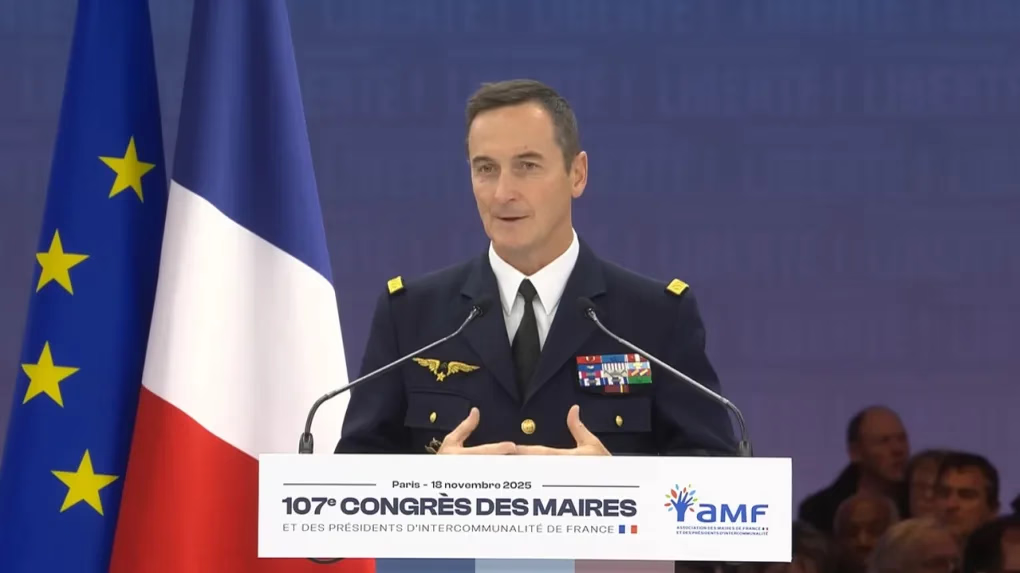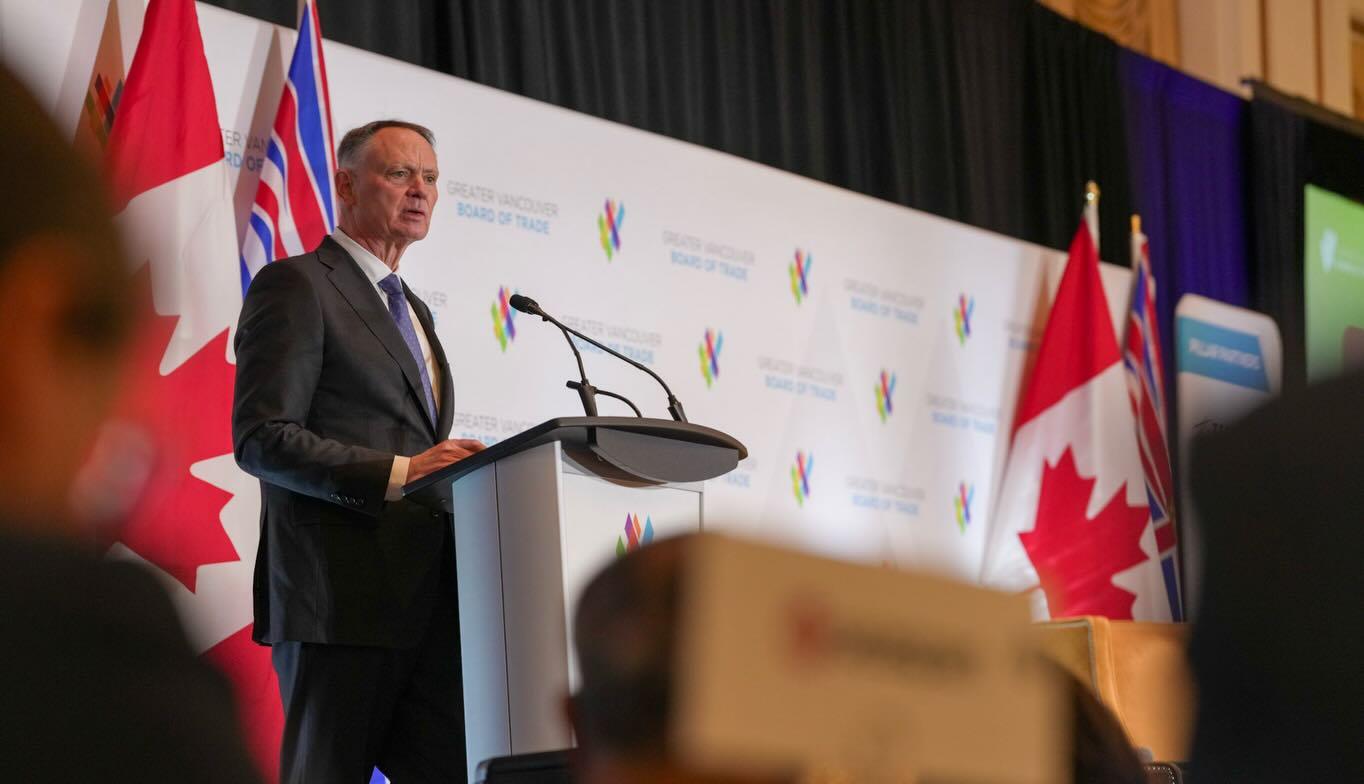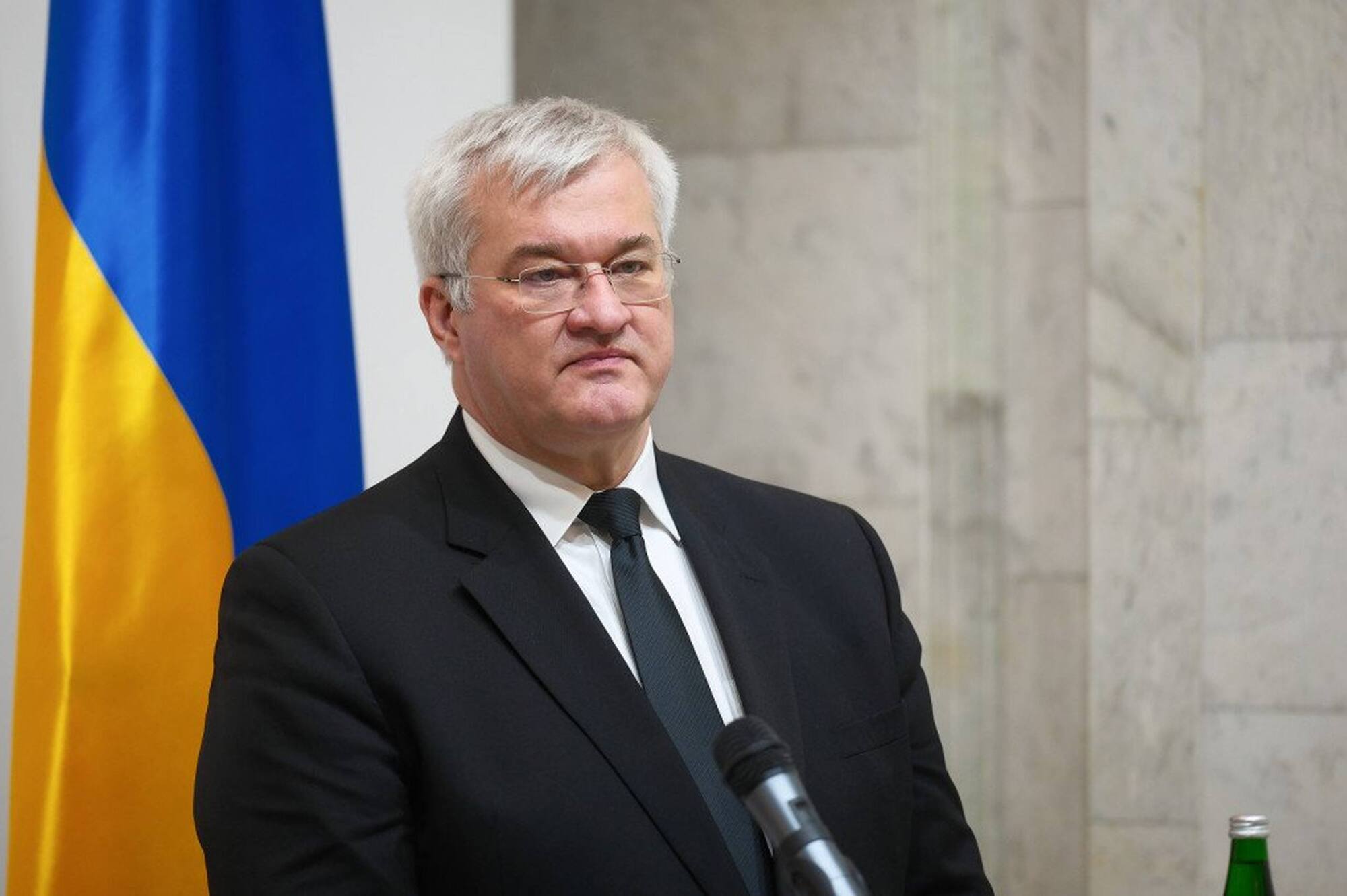Author: Oksana Melnychuk, special correspondent in France
I. Strategic Introduction: A Civil Platform for Military Imperatives
A. The 107th Congress of Mayors as a Strategic Forum (November 2025)
The 107th Congress of Mayors and Heads of Inter-Municipal Associations of France took place at the Paris Expo – Porte de Versailles from November 18 to 20, 2025. Traditionally, it focused on local governance and civic engagement, especially ahead of the municipal elections in March 2026. However, this purely civil environment was chosen for an unprecedentedly frank military warning.
The main speaker from the military leadership was Army General Fabien Mandon, who took office as Chief of the General Staff of the Armed Forces (CEMA) on September 1, 2025, succeeding General Thierry Burkhard. General Mandon, who previously served as the head of the President's personal staff, used this high-profile platform to address approximately 34,000 local leaders in France.
He began his speech by stating that a "particularly serious moment" ("le moment est particulièrement grave") had arrived and that the international situation was "deteriorating" ("se dégrade"). This initial framing immediately shifted the discussion from local issues to national security and survival.
B. Strategic Importance of Addressing Local Governance
The choice of CEMA to speak specifically at the Congress of Mayors underscores a profound military need for the operational implementation of the Lien Armée-Nation (Army-Nation Link) concept at the grassroots, municipal level. Preparing for high-intensity conflict (HIC) requires not only the modernization of the armed forces but also full national mobilization.
Mayors are a key link between the central state and the population. By addressing them, CEMA confirmed that the municipal level is a critically important strategic asset, transforming defense readiness from an exclusively Parisian or military concern into a communal and civil responsibility.
The nature of General Mandon's speech, particularly his sharp rhetoric (which included a mention of the need to "come to terms with the loss of our children"), indicates a deliberately crafted "shock doctrine" of strategic communication. The aim of this method was to bypass political inertia and provoke the necessary public consciousness. Analysis shows that military leadership believed previous, softer warnings failed to create the sense of urgency needed to secure funding and fully implement the ongoing military transformation.
II. Geopolitical Assessment: A Clear Timeline of Degradation
A. Global Strategic Outlines: "A Very Grim Portrait"
General Mandon presented "a very grim portrait" of the international situation, which requires France to adapt to a multipolar and high-risk global arena.
U.S. Withdrawal and Indo-Pacific Threat: CEMA noted that the United States is strategically shifting its focus to Asia, thereby reducing its involvement in European security. In this context, China is identified as the main military power, possessing "the best military equipment in the world." The general referenced Pentagon assessments suggesting that China could invade Taiwan by 2027, which would inevitably lead to confrontation with the United States. This establishes a short-term benchmark for high-intensity conflict.
The Southern Arc: The general also pointed to deep destabilization in the Sahel, where "terrorist leaders" are now located. Additionally, he highlighted the spread of war to the Middle East following the October 7, 2023 attacks against Israel, mentioning French aircraft conducting interventions near Yemen to ensure the safety of commercial vessels. This confirms that alongside preparations for HIC, France will continue its low- and medium-intensity expeditionary commitments.
B. The European Confrontation Clock: The 2030 Imperative
The most acute warning concerned the European continent and Russia. General Mandon stated directly that Russia "will not stop at Ukraine" and is preparing for "confrontation by 2030 with our countries and NATO members."
This timeframe, set for 2030, became the basis for his call for immediate national mobilization. CEMA emphasized that the goal is for France to be ready "in three to four years" (i.e., by 2028/2029) to demonstrate its strength to Russia and compel it to abandon its ambitions. This accelerated mobilization timeline is directly related to current defense investments.
C. The Strategic Function of Deterrence
The specific timelines for threats (2027 for Asia, 2030 for Russia) underscore the necessity for France to act within two different but interconnected strategic timeframes: deterring HIC in Europe while simultaneously managing global destabilization.
General Mandon's address regarding France's readiness is not only an internal communication but also a critical element of strategic deterrence, correlating with Article 5 of the North Atlantic Treaty and France's role as a framework nation in European defense.
The military leadership believes that if Russia perceives the will of Europeans (their moral resilience) as weak, deterrence will fail. Mandon asserted:
"Russia is convinced that Europeans are weak. However, we are strong. Fundamentally stronger than Russia."
Thus, his speech serves as a preemptive strike against this perception of weakness, using mayors as instruments to project national resolve. This transforms France's psychological readiness into a strategic deterrent factor aimed directly at Kremlin calculations.
III. The Controversial Core: Deconstructing the "Spirit of Strength" Doctrine
A. The Imperative of Moral Resilience (Force Morale Collective)
General Mandon acknowledged that France possesses the necessary technical means, including nuclear deterrence, which is an objective strength of the country, as well as the ability of its professional army to rapidly deploy in the most hostile regions of the world. However, he stated that the country lacks the "spirit of strength to accept that we will have to inflict pain on ourselves to protect the Nation."
Readiness, he said, requires acceptance of two forms of sacrifice:
Human Sacrifice: the agreement to "come to terms with the loss of our children."
Economic Sacrifice: the agreement to "suffer economically because priorities will be given to defense production."
Mandon warned the mayors:
"If we are not ready for this, then we are in danger. You must talk about this in your communities."
B. Rhetorical Analysis: "Come to Terms with the Loss of Our Children"
This phrase became the most controversial part of the speech, provoking an immediate political reaction. Minister of Armed Forces Catherine Vautrin promptly defended General Mandon, stating that his words were taken "out of context for political purposes." She explained that this phrase belongs to "the military language of a commander who knows daily that young soldiers risk their lives for the Nation."
Despite this official clarification, the choice of the term "children" carries deep civil and historical resonance, reminding of the collective memory embodied in local memorials to those who fell in World War I. The use of this language was intended to ensure that citizens grasp the seriousness of the military threat on a personal level, even if the general meant military personnel.
Political opponents, particularly the French Communist Party (PCF) and Jean-Luc Mélenchon, sharply condemned the remarks, calling them "scandalous and dangerous," accusing General Mandon of exceeding his devoir de réserve (military duty of restraint) and promoting an aggressive agenda aimed at justifying colossal investments for participation in an arms race.
C. The Doctrine of Comprehensive Defense (Défense Globale)
CEMA's address is an attempt to bridge the gap between the mentality of a professional, expeditionary army that has developed over recent decades and the necessity of preparing for Guerre Totale (Total War), where national efforts and sacrifices are central to defense strategy.
Mandon's call for "spirit of strength" is the quintessence of the national resilience doctrine. The Ministry of Armed Forces clearly stated that resilience is a collective moral strength, without which technical superiority will be futile. By demanding acceptance of economic hardships and potential losses, General Mandon prepares society for the reality that the next conflict will not be confined to external theaters of action but will require reliance on the internal front, civil defense, and prioritization of resources.
IV. Operationalizing National Resilience: Mayors as Rear Bases
A. Designating the Role of "Rear Bases" (Bases Arrières)
General Mandon directly called on mayors to become "the rear bases of his armies." He emphasized that mayors have a "fundamental role" as "the best channel" of communication with citizens, and he needs their help to "share this vision," which, he acknowledged, will raise concerns and questions.
CEMA's demands mark a practical shift in policy from passive military-civil dialogue to active, measurable operational support at the local level. This indicates that the armed forces are attempting to transfer responsibility for part of the operational infrastructure and services to municipalities within the framework of a new doctrine of distributed mobilization.
Traditional large barracks are insufficient for mobilizing HIC. Utilizing local civil infrastructure (schools, housing stock) ensures rapid dispersal and territorial coverage of security, which is a critical element within the framework of territorial defense organization (OTIAD).
B. Detailed Operational Requirements (Three Pillars)
The operational requirements for local leaders were divided into three main areas:
1. Strategic Communication and Education
Mayors must explain the threatening situation to citizens and actively utilize existing defense structures. They should engage with defense correspondents (designated local officials responsible for communication between the army and the nation), Departmental Military Delegates (DMDs), and commanders of local regiments and naval bases. This is necessary to build collective moral resilience and counter misinformation.
2. Logistical Support and Housing
Mayors must facilitate operational readiness by providing support to military personnel and their families, which is a key factor in personnel retention and rapid force deployment.
Specific requests included:
- Providing places in kindergartens and schools
- Offering housing for military families who are relocating or being mobilized
3. Support for Training and Maneuvers
Preparing for HIC requires large-scale and complex exercises. General Mandon asked mayors to "please try to have a positive view of these actions," as the army needs space to conduct large-scale maneuvers. This often faces local resistance, and CEMA sought to ensure political support at the community level.
C. Synergy with Reserve and Defense Structures
CEMA's address strengthens the course towards increasing the numbers and operational standards of reserve forces (Garde Nationale). Local communities and employers are crucial for supporting reservists, as legal risks related to injuries or deaths of reservists can arise without their assistance.
This call to action is a logical continuation of previous partnership initiatives, such as the partnership between Armée de Terre (French Army) and AMF, aimed at strengthening the Army-Nation link.
V. Political Resonance and Strategic Coherence
A. Political Division and Devoir de Réserve
The rhetoric of General Mandon provoked an immediate and strong reaction across the political spectrum, which was a primary goal of CEMA.
Minister of Armed Forces Catherine Vautrin firmly defended Mandon, stating that his comments were legitimate warnings about threats, and that they were "taken out of context for political purposes." This support demonstrates official government approval of CEMA's tough rhetoric, aligning with the need to create a public consensus around military priorities.
Key figures from the Senate Foreign Affairs and Defense Committee, such as Cédric Perrin (LR) and Rashid Temal (PS), agreed on the necessity of "awareness of risks" (prise de conscience). They noted that the military has long warned of potential "military shock." This confirms CEMA's strategic diagnosis, even if its phrasing was deemed somewhat "clumsy." Senators emphasized that one cannot appear weak before resolute adversaries.
However, far-left parties (PCF, La France Insoumise) viewed the speech as a violation of the devoir de réserve (duty of restraint). They argued that the military leader has no right to set the national tone for "preparing for war" and that his words are used to justify an aggressive program and disproportionate military budget.
B. Strategic Use of Controversy
Analysis suggests that General Mandon's breach of the spirit, if not the letter, of the devoir de réserve was a calculated move sanctioned at the highest political level (Élysée Palace). If CEMA speaks so directly about sensitive topics, it serves the agenda of the executive branch, preparing the population for necessary, potentially unpopular, military and economic sacrifices associated with the Military Programming Law (LPM).
The controversy ensured that national attention was focused precisely where the Ministry of Armed Forces deems critical: on defense readiness and the inevitable Russian threat.
C. Legislative and Budgetary Underpinnings
Mandon's speech provided a powerful political justification for the massive investments outlined in the Military Programming Law for 2024–2030. By presenting defense production as an immediate economic priority and the threat as imminent (3–4 years), Mandon helps secure public and political support for potentially contentious budget allocations.
Furthermore, CEMA's call for national awareness reactivated discussions on defense mobilization policy, including the idea of introducing a new voluntary military service (Service Militaire Volontaire,



